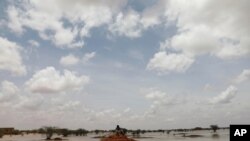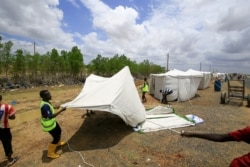United Nations officials in Sudan have sent out an urgent appeal for $1.6 billion to provide life-saving assistance to citizens, including hundreds of thousands of people affected by floods. Recent flooding caused by heavy rain has affected 17 of Sudan’s 18 states.
More than 20,000 houses were destroyed and another 20,000 were damaged by the floods, according to Saviano Abreu, spokesperson for the U.N. Office for the Coordination of Humanitarian Affairs in Khartoum.
“Here in Sudan we have around 250,000 people affected by floods that started in mid-July but intensified by the end of the month. During the month of August is when we saw most of the rain, concentrated in a short period of time,” Abreu told VOA’s South Sudan in Focus.
About 2,000 drinking water sources are now contaminated or non-functional, which is depriving citizens of access to clean water, said Abreu.
Some states are harder hit by the floods than others.
“Sinar for example, it’s around 42,000 people but the same situation we have in Aljazeera, East Darfur, Kasala, South Darfur, so it’s around the whole country, and the problem we have is not going to stop,” Abreu told VOA.
Heavy rain is forecast for coming weeks.
Sudan’s humanitarian situation was already bad before the COVID-19 pandemic hit.
Last month, international humanitarian partners released Sudan’s Integrated Food Security Phase Classification, or IPC, which said close to 10 million Sudanese face acute food insecurity due to a number of factors, including conflict, high inflation and COVID-19.
Fortunately, Abreu said, emergency supplies were pre-positioned before the heavy rains came.
“We prepared and had the capacity and supplies to respond to 250,000 people” which is the exact number of people in need now. The problem is that it is only the middle of the month. “We have already reached our capacity to respond,” said Abreu.
The U.N. has received about 40 percent of its appeal so far.
The additional funding will help flood victims during an outbreak of diseases which usually follows the rainy season, give shelter to people in Darfur and others displaced by violence, and fight COVID-19, according to the U.N.





